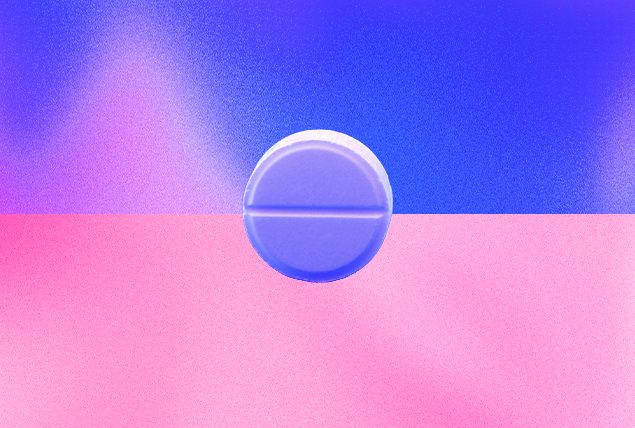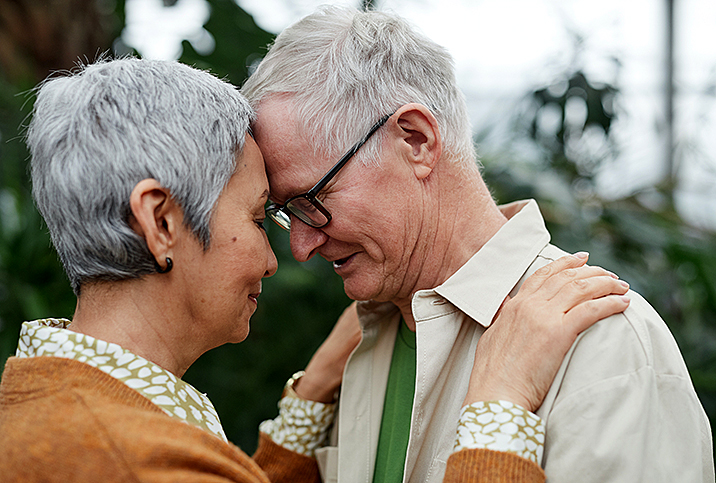A Hormone May Boost Desire in People With HSDD, Study Suggests

Many people probably feel as if they suffer low libido from time to time. That's typical. Hypoactive sexual desire disorder (HSDD), however, is a rare disorder in both males and females that can lead to a complete loss of sexual interest.
Exact quantitative data on the prevalence of the disorder is lacking, but the United Brain Association estimates that as many as 15 percent of men experience HSDD. While everyone's experience with the disorder can be different, some people might find HSDD to be extremely distressing.
Currently, no pharmaceutical HSDD treatment for men exists, but researchers at Imperial College London may have found a potential aid: a hormone called kisspeptin showed promising results in a February 2023 study.
What is hypoactive sexual desire disorder?
The American Sexual Health Association (ASHA) defines HSDD as the absence of sexual fantasies and thoughts, and/or desire for or receptivity to sexual activity that causes personal distress or difficulties in a relationship.
Importantly, the personal distress of HSDD is a defining characteristic, because everyone has their own threshold for a level—or lack thereof—of sexual activity in their own lives. For some people, a lack of libido or little to no interest in sex may not be a problem; for others, it could cause a significant impact on their personal well-being, as well as lead to issues with a partner.
"The key thing is that it has to be distressing to the individual," said Alexander Comninos, B.Sc., a consultant endocrinologist at Imperial College London and one of the study's co-authors. "Some people are not distressed by their low sexual desire, so they didn't have this disorder."
It's the personal level of distress combined with the timeline of symptoms that distinguish people with HSDD from individuals who define themselves as asexual, according to a 2021 study published in the journal PLOS One. People who have HSDD often have enjoyed sexual activities in the past and are now experiencing symptoms of being uninterested in sex or not enjoying sex as they once did.
They feel a high amount of distress as a result.
Asexual individuals, on the other hand, tend to report sometimes lifelong disinterest in sex and do not experience distress over the absence of sexual activity in their lives.
HSDD is often clinically defined in females, but symptoms in anyone can include the following:
- Symptoms persisting for at least six months
- Decreased or total lack of sexual interest
- Decreased sexual thoughts or fantasies
- Not responding to any sexual propositions from a partner you were sexually active with previously
- Decreased sexual pleasure
- Decreased arousal, which can also happen even after becoming initially aroused
What's behind HSDD?
Treatment for hypoactive sexual desire disorder has long been lacking for a few reasons:
- The disorder can be misunderstood.
- It might coincide with other medical conditions, such as diabetes and depression.
- Individuals may avoid seeking help for what they believe to be a personal problem, not a treatable medical condition.
Comninos explained that men in particular might go to their doctors thinking they have erectile dysfunction (ED) when the real issue is the mind, not the mechanics. He called it a hidden problem for people distressed by low sexual desire.
Compounding the problem is a noticeable lack of effective treatment. Postmenopausal women have a choice of two medications that may help but are not well tolerated, but men have no medications at all to help with the disorder.
In an attempt to change this situation, researchers at Imperial College London took a new approach to treatment by looking at the physical manifestations of the disorder in the brain. Based on recent insights, they explained that HSDD may be triggered by hyperactivation in areas of the brain involved in processing and sexual desire.
"The overall cause is thought to be an imbalance in your brain, where there is excess activity in the self-monitoring and introspective areas," Comninos said. "So, essentially, overthinking."
He added that someone with HSDD usually has no underlying cause for their low libido but instead might focus on aspects such as performance or what their partner is thinking. All of that overanalyzing physically suppresses the sexual parts of the brain.
In short, the person experiencing HSDD may be sabotaged by their own brain.
To treat a condition that originates deep within the brain, researchers tapped into how the brain works with sexual desire. Comninos explained that he and his fellow researchers have known for a while that kisspeptin, a reproductive hormone, can play a key part in sexual desire.
When they looked into the data, though, it showed kisspeptin signaling in many parts of the brain. It was not just in the central areas that control reproductive hormones, but in other areas, such as the limbic area, that are involved in behavior and mood. This widespread signaling, along with preliminary studies that found kisspeptin had a "boosting effect" on sexual brain processing, prompted this study to look specifically at HSDD.
The results were promising. The study became the first randomized clinical trial to provide clinical evidence that kisspeptin administration can impact sexual brain processing in men with HSDD. The researchers have both penile arousal changes and brain MRI scans to support them.
It's especially promising that the team was able to gather such clear results when using magnetic resonance imaging in a cold, uncomfortable, loud environment to look at the brain for something as involved as sexual desire, Comninos added.
"We were pleasantly surprised to see that we can see positive effects in that environment, which we hope would, therefore, translate to even stronger effects in a more comfortable environment, such as a patient's home," he said.
What future treatment might look like
The 2023 study that Comninos and his team worked on was a small one, involving only 37 men, but he believes there is promise for kisspeptin as a potential treatment for HSDD, especially in males, where effective medications are sorely lacking. Men may get kisspeptin through an IV drip, as they did in the study, but that's "inconvenient for a sexual encounter," he said.
As such, doctors are looking at ways to better deliver the hormone, such as through a subcutaneous injection, similar to how people with diabetes administer insulin.
"We're also looking at administering it as a nasal spray, and we have some good preliminary data there that we're working on," he added.
Eventually, full treatment of the disorder may involve a combination of methods, especially if there are other factors contributing to the sexual dysfunction or lack of desire.
For now, Comninos is hopeful about what future research might reveal regarding the benefits of kisspeptin. He noted that it has even shown some promising results in animals for health markers outside of sexual health, such as memory, cognition, metabolism and maybe even in fighting cancer.
Kisspeptin gets its name from the discovery of its parent, the Kiss1 gene, which was found in Hershey, Pennsylvania, and subsequently named after Hershey's Kisses.
With much more research, perhaps a day will come when kisspeptin as a treatment for HSDD is as mainstream as the chocolate treats for which it is named.
"It's early days," Comninos said. "I think it's promising data and it's quite exciting in the field of sexual medicine…This is a real unmet need. And now with this discovery, hopefully, we can take things forward and help more people."


















